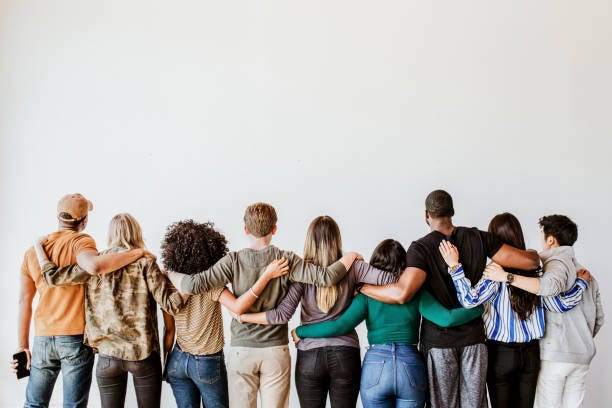It Takes A Village: What I learned About Systems (And Why You Need to Know This)
And just a full load of juggling working motherhood
You know these weeks when you wonder how you will manage to squeeze everything into a 24h day?
That was me last week, and by the looks of it, this week as well.
I needed my village.
Last week was intense - preparing for an event this week, meetings here and there, two full days of ORSC training (did it in European Time Zone so 12:00 to 20:30) and of course, not to forget my family and myself.
Mom guilt because I didn’t get to bring my son to bed, work guilt because I could not deliver as much as I could and just not enough sleep.
And before I forget, If you're wondering what ORSC is, it's Organization and Relationship Systems Coaching, and I loved it! It opened my eyes about how we all work together in systems. But more on that in a minute.
Because right now, there is so much in my head:
my son's persistent cough (yes, I squeezed in a doctor's appointment for tomorrow morning in this already crazy full week),
this week's upcoming event with our US team (so much prep!),
and oh yes - it's my husband's birthday and I still need to make it special.
Did I mention I worked on Saturday morning and the mom guilt was constantly there as well?
And not even mentioning the discussions with insurances, license extensions and yet another event at daycare I missed to pay for.
It's fascinating though - just as I'm learning about systems in my training, I'm living through the perfect example of multiple systems colliding in real life.
My family system, work system, and personal development system are all demanding attention at once.
And you know what?
It got me thinking about something really important:
None of us can do this alone. Not at home, not at work and not in private life. And definitely not as a working mom.
It Really Does Take a Village
You know that saying "it takes a village to raise a child"? Well, it does.
But here's what I've realised - it's not just about raising children.
It takes a village for pretty much everything meaningful in life.
Think about it: Who's in your village?
For me,
it’s my friends in Dubai and anywhere in the world supporting me on "am I doing this right?" parenting questions or how to drive my career (and of course all the other super important topics from bags to shoes… ;)).
It's our amazing nanny who keeps our home running smoothly even when my schedule goes crazy.
It's the Crunchmoms community and all the other moms sharing their own chaos and making me feel less alone in mine.
It’s my Mom, who is always just a phone call away, even if it is just about: do you think I should go to the paediatrician tomorrow or not?
It’s my husband, for having an amazing bond with our son and making it easy for me to not do bedtime stories once in a while
But here's where it gets interesting - this idea of a village isn't just about personal support.
In my ORSC training, we talked about how systems work, and it hit me: whether we're talking about families or companies, sports teams or friend groups, we're all part of these living, breathing systems that need nurturing and understanding.
And that need the time to get that understanding.
Because who actually takes the time to take a step back and look at not the individuals, but the invisible spiderweb in between everyone?
Where Strong WE Comes In
Remember our New Work framework discussions? This is where the Strong WE piece becomes so crucial. It's not just about having a team or being part of a system - it's about understanding how these systems work and how we can make them stronger together.
When we talk about Strong WE, we're talking about building those villages intentionally. Whether it's in our personal lives or our professional spaces, it's about creating environments where everyone can contribute their unique strengths and find the support they need.
And yes, I adjusted it again. It is work in progress and getting better with each newsletter.
5 Principles for Building a Stronger WE
During my ORSC training, we explored five principles of Relationship Systems Intelligence (RSI) that changed how I think about Strong WE.
These aren't just theoretical concepts - they're practical tools for understanding and strengthening any system we're part of.
Let me share what I learned (and how I'm seeing it play out in real time!):
1. Each System Has Its Own Unique Identity
Just like sports teams and musical groups develop their own distinct personalities, every system has its unique character that makes it special.
Personal Example: Our family has its own morning routine that probably looks chaotic to outsiders but works perfectly for us - my son's specific way of wanting his breakfast (first standing then sitting), my husband's busy morning vibes, and how we somehow all manage to get to where we need to go.
Professional Example: Each team I work with has its own culture and way of doing things - some are all about quick decisions and rapid action, while others thrive on deep discussion and consensus.
2. Relationship Systems Are in a Constant State of Emergence
Change isn't just something that happens to systems - it's an essential part of how they grow and evolve.
Personal Example: Just when I think I've got this whole work-mom balance figured out, my son starts a new phase or a work project shifts - and that's exactly how it should be!
Professional Example: The teams I work with are constantly evolving - what worked last quarter might need adjustment now, and that's not a problem to fix but an opportunity to grow.
3. Relationship Systems Are Naturally Intelligent, Generative and Creative
Every system has an inherent wisdom and creative capacity that often reveals itself if we just pay attention to what's trying to emerge.
Personal Example: When I was stressing about balancing this week's intense schedule, my family naturally started finding solutions - my husband took over bedtime stories, our nanny adjusted her hours, everything just started falling into place.
Professional Example: Often when teams seem stuck, if we step back and ask "what's trying to happen here?", amazing solutions emerge that no individual could have created alone.
4. Relationship Systems Rely on Roles
Roles belong to the system, not to individuals, and understanding this can transform how we approach leadership and teamwork.
Personal Example: These weeks are busy. So roles need to shift. My husband took over to bring my son to bed, our nanny is picking him up on days I am not around. Nobody had to be asked - the roles just naturally shifted to keep our family system working. It reminded me that roles aren't fixed - they flow where they're needed.
Professional Example: When teams understand that leadership is a role of the system rather than a fixed position, it empowers everyone to step up when needed and lean into the system for solutions.
5. Every Member is a Voice of the System
Each person in a system brings a unique and valuable perspective that contributes to the whole.
Personal Example: Even my toddler's tantrums can be seen as the system's way of telling us something needs attention - maybe we've been too busy and need more family time.
Professional Example: In team sessions, I make sure to hear from everyone because each perspective - from the newest intern to the most experienced manager - holds a piece of the system's wisdom.
Finding Your Village
Whether you're:
A working parent juggling multiple responsibilities
A team leader managing complex dynamics
Anyone trying to balance different life systems
Remember that no system exists in isolation. The key is recognising and nurturing the villages that support each system in your life.
This Week's Reflection Questions
Which systems in your life need more attention right now?
Who makes up your village, and have you thanked them lately?
How can you better support the systems you're part of?
As I head into another intense week this time with the event actually happening, I'm reminded that it's okay to rely on our villages.
In fact, it's the only way it works.
Would love to hear about your experiences with managing multiple systems.
What works for you? What challenges do you face?
Think out of the Box and stay curious! Also about systems! (the space between people)
Constanze
P.S. Special thanks to my village this week - you know who you are! 💕












